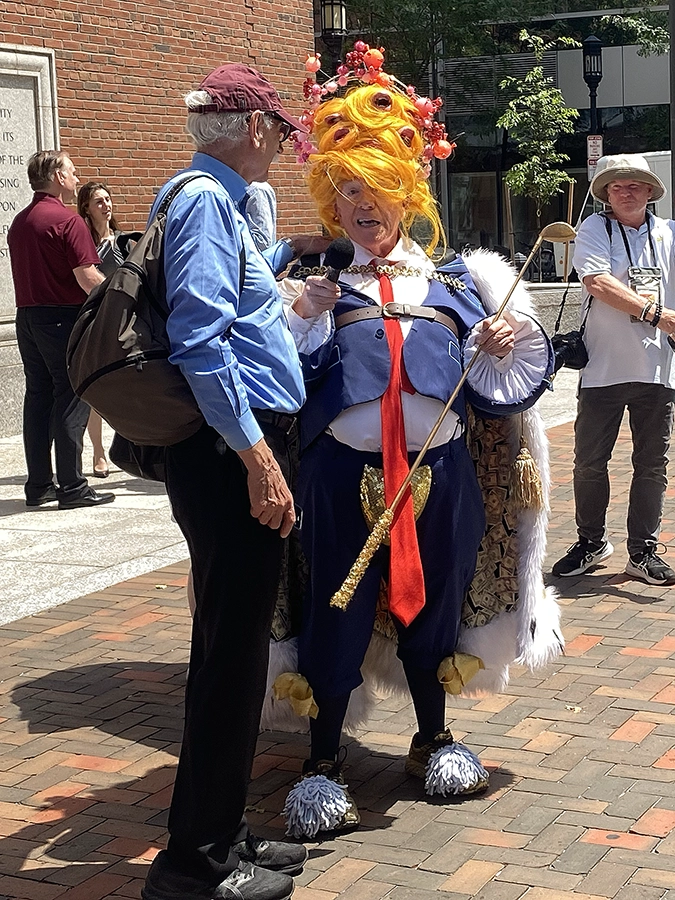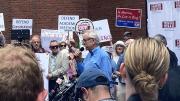A federal judge on Monday heard oral arguments in Harvard’s much-anticipated federal funding case against the Trump administration, which challenges the freezing of more than $2.2 billion in research grants and contracts. In a hearing that lasted for more than two hours, Judge Allison D. Burroughs probed the government’s rationale for withholding funds, while the University’s lawyers painted them as unconstitutional violations of free speech.
Journalists and spectators packed into the Boston courtroom, with many lining up to enter more than 30 minutes prior to the start of the proceedings. Multiple lawyers representing Harvard were in attendance, alongside lawyers for the American Association of University Professors (AAUP) and its Harvard chapter. (The organization filed a separate lawsuit in April challenging the funding freeze—which was later consolidated with the University’s.)
The government, meanwhile, sent a single lawyer from the Department of Justice: Michael Velchik, an alumnus of the College (‘12) and Harvard Law School (‘16)—who once gave the Latin oration at Commencement.
“Lonely over there?” the judge asked Velchik at the start of the hearing.
“The executive branch speaks with one voice,” Velchik responded.
Harvard’s lawyers argued that the Trump administration’s decision to freeze research funding was an unconstitutional attempt to exercise government control over one of America’s oldest higher education institutions. “This is a blatant, unrepentant violation of the First Amendment,” said Steven Lehotsky, J.D. ‘02.
The government contended that the funding cuts were a legitimate response to antisemitism on Harvard’s campus in the wake of the October 7, 2023, terrorist attacks on Israel and the subsequent war in Gaza. Velchik pointed to several campus incidents, including a pro-Palestine encampment in Harvard Yard in May 2024 and the vandalism of the John Harvard statue that October. American taxpayer dollars should not be given to “institutions that discriminate on the basis of race,” he said.
“I am both Jewish and American, so I hear what you’re saying,” Burroughs acknowledged before asking Velchik nuanced questions about the administration’s position. She challenged him to describe the relationship between the cancellation of scientific and medical grants and allegations of antisemitism, adding, “You’re not taking grants away from labs that have been antisemitic.”
Velchik said that federal contracts include clear language stipulating that the government can terminate its grants if they do not align with agency priorities, and that combatting antisemitism is one such priority.
“Harvard should have read the fine print,” he said.
But Burroughs questioned that interpretation.
“It seems to be your idea that you can terminate a contract even if the basis for the termination is a constitutional violation,” she said. If the federal government can decide to withdraw funding of any contract over issues of speech, she added, the consequences “in terms of constitutional law are staggering.”
The University charges that the Trump administration withheld federal funding as punishment after Harvard refused to comply with a long list of demands concerning its management of internal academic affairs. The demands, first sent on April 11, pushed for sweeping changes in disciplinary procedures, admissions and hiring policies, and the termination of diversity, equity, and inclusion programs.
In court on Monday, the government tried to paint the dispute in a different light. “This case is ultimately about money,” Velchik said, arguing that the case should have been heard in a federal claims court, rather than a federal district court. “They want the U.S. to write a check for the money the government stopped giving,” he added.
“I hear what you’re saying and you’re saying it very well,” Burroughs told Velchik at one point during the proceedings. “That Harvard education is paying off well for you.”
The judge did not rule from the bench on Monday but promised to issue an opinion quickly. Harvard lawyers have asked for a ruling by September 3, 2025—the date by which the University needs to begin submitting paperwork to close out grant funding.
Alumni rally to support the University
Outside the district court in Boston’s Seaport district, a crowd of more than 50 Harvard supporters gathered in a rally organized by alumni group Crimson Courage.

Chants of “Veritas!” and “No kings here!” could be heard, and participants carried numerous signs, including “Hands off Harvard,” “Let academic freedom ring,” and “Strong USA needs Harvard.”
Two professors from the T.H. Chan School of Public Health addressed the crowd and spoke of longstanding grants—including cancer research funding—that have been terminated by the Trump administration.
“We are the University, and if we lose our community through layoffs and funding cuts, we will lose our University,” said Kelsey Tyssowski, a postdoctoral researcher and member of the Harvard Academic Workers Union. She spoke about the particular challenges confronting non-tenured faculty and researchers, who are dependent on federal funding to gain experience in managing large-scale studies—experience that is often a prerequisite to gaining a permanent foothold in academia.
Kirsten Weld, a professor of history and the president of Harvard’s AAUP chapter, told the group that it was the faculty’s moral and pedagogical duty to push back against the government’s “blatantly unlawful thought policing.” To cheers from the crowd, she added, “They will not stop until every school in the U.S. is brought under their control.”
Harvard Undergraduate Association president Caleb Thompson ’27 discussed the impacts of the funding cuts on College students, characterizing the recent months as “a period of great anxiety and concern.” The decision to freeze research grants, he said, “sends a strong message that the U.S. is no longer interested in investing in science, technology, and innovation.”
The rally concluded as organizers led the crowd in a rendition of a civil rights era song, “Ain’t Gonna Let Nobody Turn Me ‘Round,” with one notable alteration: “Ain’t gonna let no Trump turn me ‘round, turn me ‘round,” the updated lyric went.









